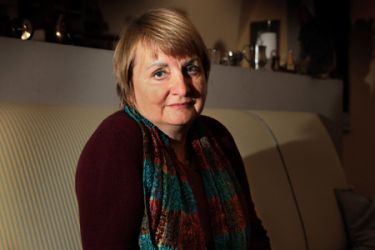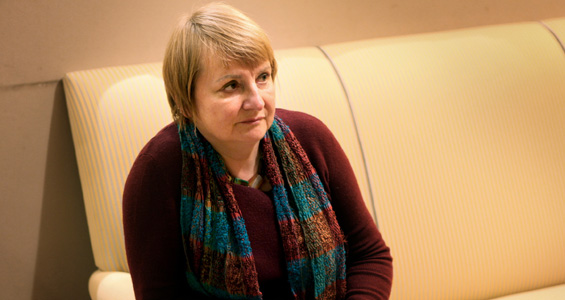‘No forgiveness without repentance’
Civil rights campaigner says there has never been a true reckoning of the GDR’s crimes.

 |
| Vera Lengsfeld discovered that her husband had spied on her for the Stasi [Credit: Penny Bradfield] |
Many events, large and small, in the East and the West, helped to bring the Cold War to a peaceful end.
But it is the events of November 9, 1989, that the world remembers.
The 154km of reinforced concrete and barbed wire, enclosing half a city, came to symbolise a government that could not trust its own people.
For the second time in the 20th century Berlin hosted the last battle in a global war. But this time, instead of laying in ruins, it stood unscathed. Rather than clearing rubble and building from scratch, Germany became a whole country again in less than a year.
Al Jazeera spoke to people who are witnesses to that period, their lives shaped by the political divide that dominated the second half of the 20th century. In turn, they helped to shape those events that the world celebrates on Monday, November 9, 2009.
| Special report |
|
|
The twists and turns of Vera Lengsfeld’s life mirror her country’s complicated, often painful, political division and reunion. There is persecution, betrayal, celebration, and the uneasy question of whether grave sins can be forgiven.
A prominent civil rights campaigner in Communist East Germany, Lengsfeld – who is best known internationally as the political candidate who recently used a doctored campaign poster featuring herself and Chancellor Angela Merkel each displaying generous cleavage – was jailed in 1988 for protesting against the regime, and then thrown out of the country.
But by sheer chance, she returned to Berlin on the morning of November 9 the following year, just hours before the wall fell, as if fate wanted her there.
The reason for Lengsfeld’s serendipitous return just hours before the Wall fell says much about the petty machinations of the regime she fought against.
East German officials had orchestrated the expulsion of her eldest son, then 16, and eight of his friends, from school. They did it simply because they thought it might prompt Lengsfeld’s son to go and live with his troublesome mother in England, where she was studying philosophy at Cambridge.
They hoped this in turn would prompt her to stay away from East Germany.
Instead, Lengsfeld returned to Berlin to try to reason with the regime officials. With her still-valid East German passport, she managed to cross from West Berlin into the Eastern half through a checkpoint at the wall.
Shaping a new Germany
That night, she joined the throngs of ecstatic East Berliners at the Bornholmerstrasse checkpoint – November 9’s ‘ground zero’. It was here that border guards first gave way to the unstoppable power of the people and opened the gates, letting the crowds flood through into West Berlin.
“I remember the guards standing there,” Lengsfeld recalls. “People had put glasses of champagne in their hands, which they weren’t drinking, and flowers in their buttonholes. And the guards were standing there like puppets. They just didn’t know what to do.”
Although she had been an effective and eloquent critic of the East German regime, Lengsfeld wanted only to return to England and finish her degree. But friends and former colleagues persuaded her to stay and help shape the new, reunified Germany.
Lengsfeld became a member of the reunified parliament in Bonn and went on to play a pivotal role in passing the law that guaranteed every former East German citizen was given access to their Stasi file – the mind-numbingly detailed reports the repressive East German police kept on every person they deemed worthy of attention.
As many as six million people – nearly one tenth of the population – had files.
Betrayal
Lengsfeld, like many victims of the Stasi, believed that opening the files to scrutiny was a vital step in the nation’s coming to terms with this dark chapter.
But it was her own file that was to cause her the greatest pain. In 1991, she discovered that her husband, poet Knud Wollenberger, had been spying on her for the Stasi.
Under the codename ‘Donald’, Wollenberger, the man to whom she was married for 11 years and the father of her two children, had passed on to the state security almost everything she said and did. He had even reported details of their sex life.
She divorced him in 1992 and, for years, they did not speak. More than a decade later, he wrote to her and begged for her forgiveness, which she gave.
But Lengsfeld, along with many Stasi victims, believes that 20 years on from the fall of the wall, there has never been a true reckoning of the Communist state’s crimes.
She says that Germany was so eager to move on in unity that it brushed too much dark history under the carpet.
“You can only forgive somebody if they are repentant. If there is no repentance, you cannot forgive. It took my former husband 10 years but he was repentant. He explained why he did it and asked for forgiveness.
“But most [former GDR officials] are not repentant. They say, ‘We did the right thing’. They still believe people escaped the GDR because they were deceived by the West German security services, not because they couldn’t bear the system anymore.”
Unhealed wound
Tricky politics meant that the matter of Stasi human rights abuses have remained an unhealed wound, she says. Though there were several high profile prosecutions against Communist leaders, abuses have gone largely unpunished because it was decided that East Germans could not be prosecuted under West German law.
Lengsfeld believes that former Chancellor Helmut Kohl, who saw Germany through reunification, avoided debate about justice for victims of the East German regime for fear it would alienate voters in the East and lose him the first post-reunification election.
After that, no German leader has had the stomach to bring the issue up again, she says.
“There was never really a debate about what kind of regime it was. They left it to the victims … to confront it all and do the talking. That was a big, big mistake.”
So far, she adds, the 20th anniversary celebrations are looking like another missed opportunity.
“There will be lots of newspaper articles and a big party at the Brandenburg Gate, but there won’t be the discussion we really need.”
